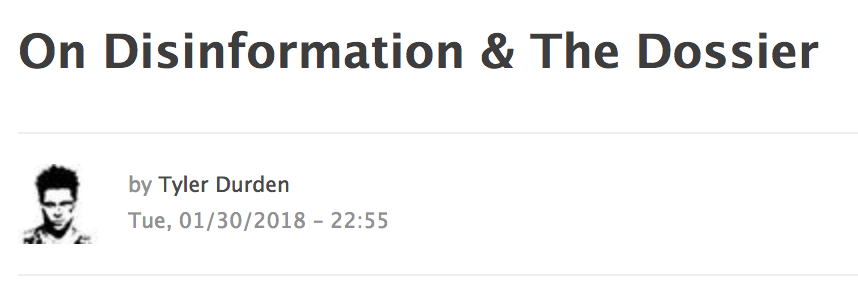A New Kind of Fake News Assault: 47 Sites (Including Zero Hedge) Steal an emptywheel Post
Update: Zero Hedge says the piece was sent in via their tips line, which led them to believe it was fair for reposting. They have agreed to take it down.
Update: I’ve taken off one more site.
A little over a week ago, emptywheel was damaged by a kind of fake news attack I hadn’t heard of before.
First, Zero Hedge stole my post, “On Disinformation and the Dossier,” reposting it without permission almost in its entirety.
From there, the 47 other dodgy sites listed below, mostly but not all Forex Trading sites, stole it.
The mass theft is all the more interesting given the topic of the post, arguing that it is increasingly likely Russia inserted disinformation into the Steele dossier to make it harder for the Democrats (and, perhaps, the FBI) to respond to Russia’s attack. Not even Zero Hedge, however, seems to have understood the post itself doesn’t support the either the pro-Trump or the FBI-abuse narrative.
We don’t have the bandwidth to chase down all these dodgy sites to issue takedown notices (and a goodly number of these sites are hosted in Europe), though we did try with ZH itself. But we are posting the following takedown language to make it clear we consider this theft, and to make public what happened.
Takedown language
It has come to our attention the websites listed below have made unauthorized use of copyrighted and protected work entitled “On Disinformation and the Dossier” (the “Work”). All rights have been reserved to the Work, first published on January 29, 2018. The protection so described has been actively and affirmatively asserted and noticed to the public for years.
The websites’ reposting is essentially identical, if not in fact identical and copied in whole, to the Work, and clearly used the Work as its basis, if not the entirety. A word-for-word comparison between the Work and your work reveals no difference between the two articles. That is telling.
As you neither asked for, nor received, permission to use the Work as the basis for your reprint, nor to make or distribute copies, including electronic copies, of same, we believe you have willfully infringed our rights under 17 U.S.C. Section 101 et seq. and could be liable for statutory damages as high as $150,000 as set forth in Section 504(c)(2) therein.
We simply cannot, and will not, allow our work to be so converted without knowledge, permission, control and consent by emptywheel.net and therefore affirmatively demand you immediately cease the use and distribution of all infringing works derived from any and all Emptywheel.net works as described herein, and all copies, including electronic copies, of same, that you deliver to us, if applicable, all unused, undistributed copies of same, or destroy such copies immediately and that you desist from this or any other infringement of our rights in the future.
Sites stealing the Disinformation post
Note: I don’t recommend you click through on any of these links, as I can’t vouch for the safety of any of these sites.
- URL: https :// www.zerohedge. com/news/2018-01-30/disinformation-dossier — Site: Zero Hedge
- URL: http :// earthsfinalcountdown. com/wp/2018/01/30/on-disinformation-the-dossier/ — Site: Earth’s Final Countdown
- URL: http :// ifttt.itbehere. com/2018/01/31/on-disinformation-the-dossier/ — Site: iftttwall
- URL: http :// www.tradebuddy. online/on-disinformation-the-dossier/ — Site: tradebuddy.online
- URL: http :// thedeplorablepatriots. com/2018/01/on-disinformation-the-dossier/ — Site: thedeplorablepatriots
- URL: https :// newzsentinel. com/2018/01/31/on-disinformation-the-dossier/ — Site: newzsentinel
- URL: http :// protradingresearch. com/2018/01/30/on-disinformation-the-dossier/ — Site: ProTradingResearch
- URL: http :// telzilla. com/zero-hedge/on-disinformation-the-dossier/ — Site: telzilla
- URL: https :// www.investingdailynews. net/on-disinformation-the-dossier/ — Site: Investing Daily News
- URL: http :// independentnews. media/on-disinformation-the-dossier/ — Site: independentnews.media
- URL: https :// www.wallstreetkarma. com/2018/01/30/on-disinformation-the-dossier/ — Site: Wall Street Karma
- URL: http :// stocktalkjournal. com/on-disinformation-the-dossier/ — Site: StockTalk Journal
- URL: https :// www.realpatriot.news/2018/01/30/on-disinformation-the-dossier/ — Site: Real Patriot News
- URL: http :// forex-enligne-fr. com/on-disinformation-the-dossier/ — Site: forex enligne
- URL: http :// forexshaft. com/on-disinformation-the-dossier/ — Site: Forexshaft
- URL: http :// wallstreetsectorselector. info/on-disinformation-the-dossier/ — Site: wallstreet selector info
- URL: http :// theforexcenter. info/on-disinformation-the-dossier/ — Site: theforexcenter.info
- URL: http :// forexnewstoday. net/on-disinformation-the-dossier/ — Site: forexnewstoday
- URL: http :// eforexblog. com/on-disinformation-the-dossier/ — Site: eforexblog
- URL: http :// options168. com/on-disinformation-the-dossier/ — Site: options168
- URL: http :// mypees. com/on-disinformation-the-dossier/ — Site: mypees
- URL: http :// top10brokersbinaryoptions. com/on-disinformation-the-dossier/ — Site: top10brokersbinaryoptions
- URL: http :// binaryoption. cz/on-disinformation-the-dossier/ — Site: binary option
- URL: http :// opinionforex-oficial. com/on-disinformation-the-dossier/ — Site: opinion forex
- URL: http :// entertainment-ask. com/on-disinformation-the-dossier/ — Site: entertainment ask
- URL: http :// binarybrokersblog. com/on-disinformation-the-dossier/ — Site: binary brokers blog
- URL: http :// forex-trading-profits. com/on-disinformation-the-dossier/ — Site: forex trading profits
- URL: http :// leaveeunow.co. uk/todays-news-31st-january-2018/ — Site: The One Hundredth Monkey
- URL: http :// uroptions. net/on-disinformation-the-dossier/ — Site: uroptions
- URL: http :// forexpic. com/on-disinformation-the-dossier/ — Site: forexpic
- URL: http :// costamesalibraryfoundation. org/on-disinformation-the-dossier/ — Site: costamesalibraryfoundation
- URL: http :// secretsforex. com/on-disinformation-the-dossier/ — Site: secretsforex
- URL: http :// forexrogue. com/on-disinformation-the-dossier/ — Site: forexrogue
- URL: http :// whatisaforex. com/on-disinformation-the-dossier/ — Site: whatisaforex
- URL: http :// megaprojectfx-forex. com/on-disinformation-the-dossier/ — Site: megaprojeectfx
- URL: http :// construction24h. com/on-disinformation-the-dossier/ — Site: construction24h
- URL: http :// forex-4you. com/2018/01/31/on-disinformation-the-dossier/ — Site: forex4u
- URL: http :// binar-experten. de/on-disinformation-the-dossier/ — Site: binarexperten
- URL: http :// tradingbinaryinfo. com/on-disinformation-the-dossier/ — Site: tradingbinaryinfo
- URL: http :// comparforex. com/on-disinformation-the-dossier/ — Site: comparforex
- URL: http :// forexoperate. com/on-disinformation-the-dossier/ — Site: forexoperate
- URL: http :// pustakaforex. com/on-disinformation-the-dossier/ — Site: pustakaforex
- URL: http :// forexdemoaccountfree. com/on-disinformation-the-dossier/ — Site: forexdemoaccountfree
- URL: http :// wordforex. net/on-disinformation-the-dossier/ — Site: wordforex
- URL: http :// forex518. com/on-disinformation-the-dossier/ — Site: forex518
- URL: http :// 4-forex. info/on-disinformation-the-dossier/ — Site: 4 forex
- URL: http :// fastforexprofit. com/2018/01/31/on-disinformation-the-dossier/ — Site: fastforex











